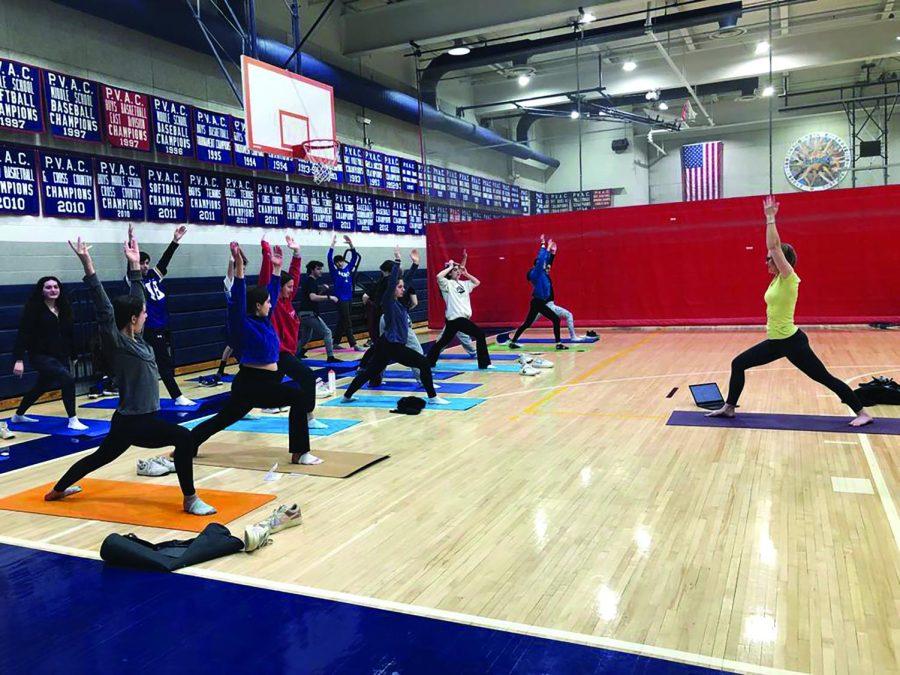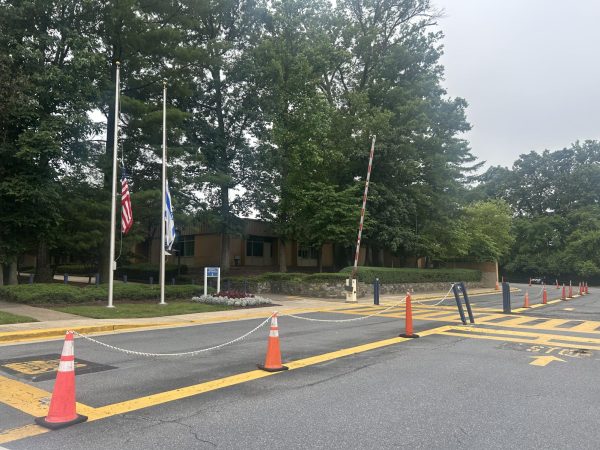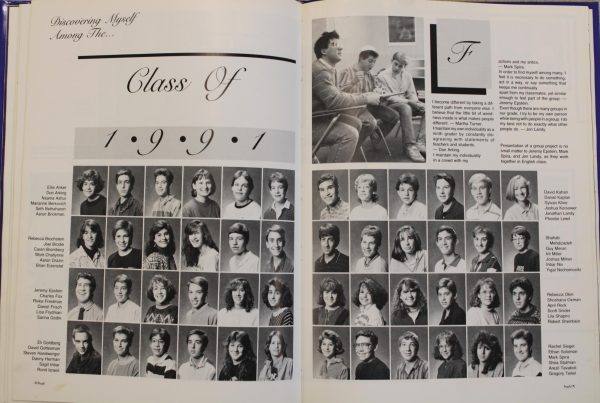Working towards wellness
Mental health awareness summit engages students
ESOL teacher Rebecca Reiser is leading the morning yoga session for a group of students. Yoga combines both healthy bodies and healthy minds, two aspects of the summit.
On March 16, instead of their usual morning classes, high school students focused exclusively on lessons relating to healthy bodies, minds, relationships and sexuality.
The Health and Wellness Center organized a 30-workshop summit with 27 speakers. Students filled out a survey before the summit indicating which sessions they wanted to attend for the three 45-minute time blocks.
Some of the speakers included alumna Dr. Rachel Rubin (‘03) who led a session on “Healthy Sexual Relationships.” In addition, Ned Johnson and Dr. William Stixrud, a teen motivational coach and a clinical neurologist respectively, led a session called “Creating the Life You Want,” focused on improving sleep habits. Sophomore Yedidya Milner-Gillers found that session particularly helpful.
“It’s information that you’re generally not taught in school, and so it was interesting to learn about these topics from the summit that kind of shocked me,” Milner-Gillers said. “There were two speakers that were really pushing the importance of getting at least eight hours of sleep, preferably nine hours. I started going to bed earlier, and I feel a lot better now.”
According to many students, the keynote address was one of the most powerful talks of the event. Marc Hausman spoke about his 16-year-old son, Landen Hausman, who died from an accidental fentanyl overdose in January of 2022. Hausman shared the story of his son’s struggle with substance abuse.
Other speakers also tried to help teens navigate difficult situations. Debbie Feinstein, the Chief of the Special Victims Division for the Montgomery County State’s Attorney’s Office, hosted a workshop about dating abuse. Feinstein regards education on this issue as the key to domestic crime prevention, public safety and individual well being.
“We talked about dating abuse, …essentially recognizing the red flags for yourself or for others and how to help a friend going through a hard time,” Feinstein said. “I was thrilled at the engagement of the students and the interest that they showed.”
Co-directors of the Upper School Health and Wellness Center Rachel Soifer and Melissa Gartner considered the summit to be such a success that they are considering hosting a summit semi-annually. They attribute the event’s success to collaboration with speakers before the summit took place.
“We went into the conversation with an idea of what we wanted to build, and the speakers already had ideas because of their particular experiences and their passions,” Soifer said.
While many students felt the event was beneficial, junior Reut Skromne said she did not feel a direct and immediate impact from most of the sessions she attended.
“Bringing in the speakers was a way to help educate the students,” Skromne said. “If any situations arise where I need to apply this knowledge, then I’m happy that I have it. But I don’t think that in my everyday life it will be information that I can use.”
However, preparing students for possible future experiences was a large part of the goal. So while many students may not need to immediately draw on the lessons they learned at the summit, organizers hope the information and skills will be there when they need them.
Soifer and Gartner recognize that they can make minor tweaks for future summits. However, they also note the immense time and effort that they and all the guest speakers put into this year’s wellness summit.
“We had such a positive, generous, caring response from professionals,” Soifer said. “They’re all coming to engage because they care and they want to give to our school community.”
The April issue of the Lion’s Tale contained a factual error in the article “Working Towards Wellness.” In it, a student source explained that they did not get many of the session choices that they requested. Since then, the Lion’s Tale has been informed that the student did receive their first choice and two of their selected small group alternates. We apologize for not verifying the information in the quote before publication.






